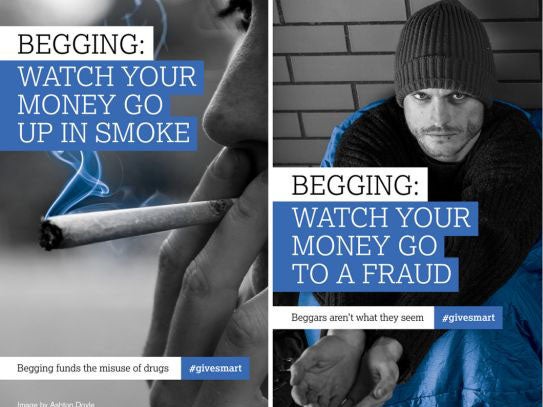Adverts banned for portraying beggars as 'disingenuous and undeserving'
The campaign 'reinforced negative stereotypes' of a vulnerable group, the Advertising Standards Authority said

Your support helps us to tell the story
From reproductive rights to climate change to Big Tech, The Independent is on the ground when the story is developing. Whether it's investigating the financials of Elon Musk's pro-Trump PAC or producing our latest documentary, 'The A Word', which shines a light on the American women fighting for reproductive rights, we know how important it is to parse out the facts from the messaging.
At such a critical moment in US history, we need reporters on the ground. Your donation allows us to keep sending journalists to speak to both sides of the story.
The Independent is trusted by Americans across the entire political spectrum. And unlike many other quality news outlets, we choose not to lock Americans out of our reporting and analysis with paywalls. We believe quality journalism should be available to everyone, paid for by those who can afford it.
Your support makes all the difference.Four Nottingham City Council posters urging people not to give money to beggars have been banned for being likely to cause widespread offence and reinforcing negative stereotypes.
One of the posters, seen in May and June, showed a person smoking a roll-up cigarette and said: "Begging: Watch your money go up in smoke. Begging funds the misuse of drugs #givesmart". A second showed a homeless man in a sleeping bag with the warning: "Watch your money to go a fraud. Beggars aren't what they seem."
Two more said begging "funds the misuse of alcohol" and "It's your choice: give money to someone begging and feed a harmful addiction ... or give to a charity which provides treatment and support."
Seven people complained that the ads portrayed homeless people in a derogatory manner and implied that all homeless people were engaged in criminal or anti-social behaviour.
Nottingham City Council said the posters were not about homelessness but aimed to discourage the public from giving money to people who begged - almost none of whom were homeless - as it was likely that the money would fund drug or alcohol addictions.
The council said the campaign was developed in response to the public's view that begging was becoming an increasing problem locally.
The Advertising Standards Authority (ASA) said the language used in the ads was "absolute" and "reinforced the implication that those who begged would use donations to fund harmful activities".
The ASA said it understood that aggressive begging was an increasing concern within Nottingham city centre and the objective of the ads was to encourage the public to give to charities.
But it said the ads "portrayed all beggars as disingenuous and undeserving individuals that would use direct donations for irresponsible means".
It added: "We further considered the ads reinforced negative stereotypes of a group of individuals, most of whom were likely to be considered as vulnerable, who faced a multitude of issues and required specialist support."
It ruled that the ads must not appear in their current forms again, adding: "We told Nottingham City Council to ensure that future ads did not portray those who begged in a manner that was likely to cause widespread or serious offence."
Press Association
Subscribe to Independent Premium to bookmark this article
Want to bookmark your favourite articles and stories to read or reference later? Start your Independent Premium subscription today.
Join our commenting forum
Join thought-provoking conversations, follow other Independent readers and see their replies
Comments